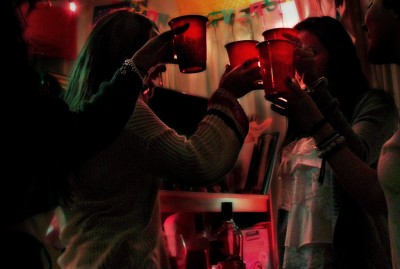
Boston University officials suspended the Kappa Sigma fraternity on Feb. 6 after receiving information about a “blackout party” that possessed questionable promotion materials and lacked university approval, said Dean of Students Kenneth Elmore.
The fraternity, which partnered with Blackout University for the party, was suspended for planning to host a function that used BU’s name without approval and for the concerning nature of the party that promoted excessive drinking and taking advantage of women, Elmore said.
“I am hopeful they will understand how objectionable this was,” he said. “I hope beyond any anger they may feel at us removing our connections from them that they do something to figure out [how] a group of them, we’re talking about a sizable number of them, could think something like this could be okay.”
The promotional materials for the party, which was scheduled for December 10, 2014, included shirtless or nearly unclothed women, with some being forced to drink alcohol. A video included on the promotional webpage stated, “No sluts were harmed in the making of this video.” The website to purchase tickets has since been taken down.
Nicholas Supple, president of Kappa Sigma, said the fraternity views this suspension as a chance to have an open dialogue with the school and the Interfraternity Council about its role on campus.
“While being suspended from campus is never a good thing, we’re confident that we will be able to find common ground with the school, and we welcome this opportunity to strengthen our chapter internally and our working relationship with the community,” Supple, a junior in the College of Arts and Sciences, wrote in an email.
A representative from IFC did not respond to request for comment.
Katherine Hasenauer Cornetta, the assistant to the Dean of Students, said although Kappa Sigma did not create the materials, they were still held responsible.
“The fraternity’s partnership with BlackoutU and their willingness to distribute and promote their material was the key to the decision making process,” she wrote in an email. “That the fraternity put their name on and disseminated that material made them responsible for the material.”
Cornetta said although the party was scheduled to happen in December 2014, the suspension was delayed because administrators went through an investigation process and winter break occurred.
Elmore said there are broader, more serious implications other than the content of the materials and the fraternity’s use of the BU name on the promotion materials.
“To me, this is about taking advantage of women, so it’s particularly troubling that we’ve spent a lot of time over the course of the last semester talking about sexual assault, talking about the larger scale issues in terms of peoples’ humanity and how we treat people, and that we still get a group of people who want to do this,” Elmore said.
Elmore said the university hopes to obtain a plan from Kappa Sigma’s national organization demonstrating how the BU chapter will prevent these types of situations when it regains its recognition.
Officials from the Kappa Sigma national organization were not available for comment.
Kappa Sigma is the second fraternity suspended by BU this semester, following Delta Tau Delta, which had its recognition withdrawn on Jan. 23 for reports of underage drinking, The Daily Free Press reported on Feb. 12.
Several students shared mixed views about the harmful nature of the party Kappa Sigma wanted to host.
Simisola Olaiya, a freshman in the CAS, said the university made the right decision to suspend the fraternity and should implement more regulations on this type of behavior.
“They [the fraternity] should get suspended and probably apologize,” she said. “People could get hurt, and if it’s demeaning towards women and other people, I don’t think that’s right. Fraternities and sororities should have stricter rules and regulations for activities. A policy should be set in place to ensure safety.”
Eddy Luo, a sophomore in the College of Engineering, said people should be the ones to decide whether a party is too risky to attend.
“If it was only a few who complained, then it’s an overreaction,” he said. “If people go to a party, they should know their own risks. Frats should be able to throw parties, and people should get to decide for themselves if they want to go to or not. The school shouldn’t get involved.”
Kelsey Koger, a junior in CAS, said although the potential party had bad implications, she has seen worse.
“I heard about a frat at another school who hung up a banner inside their party that said ‘no means yes,’” she said. “When it comes to frats and ‘rape-y’ situations they’ve gotten off in the past with just a slap on the wrist.”
Koger said she is glad BU decided to intervene and suspend the fraternity.
“Being suspended over a poster is a lot better then if somebody raped someone. It’s preventative,” she said. “For me, as a woman, I’m just thinking about my safety. I don’t care about your fun. If your fun can hurt a woman, then that’s a problem. If a male dean can recognize it, then they should recognize it too.”
Mina Corpuz contributed to the reporting of this article.





















































































































Andrew • Apr 11, 2015 at 1:11 pm
Sad to see them suspended for something that really wasn’t their fault. Just a lack of proper risk management and reviewing materials that a third party entity created. This will be a good lesson to them and I hope they bounce back